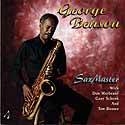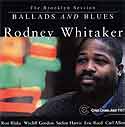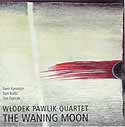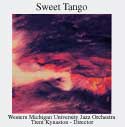| |
 
I N - T H I S - I S S U E :

Index
of SEMJA reviews
|
|
Recent Recordings by Area Musicians
BY PIOTR MICHALOWSK
Saxophonist
extraordinaire George Benson
has appeared on countless sessions but has put off making his own compact
disk until now. His quartet date Sax  Master
(Alembic Arts AACD-60, terjar@maeritech.jar)
was well worth waiting for. Accompanied by a first rate Motor City rhythm
section (Gary Schunk, piano, Don Mayberry, bass, Tom Brown, drums), Benson
works his way through a dozen standards playing the tenor and alto saxophones.
The title of the recording is an understatement; Benson has a confident
mastery of both horns that only comes from years of constant playing.
His broad tone on both saxes reveals his swing era roots, but his harmonic
sense lies more in the bebop era. The tunes are all well-known and well
chosen and the programming is well designed. After three swinging tunes,
culminating in a burning version of "The Way You Look Tonight," Benson
gives us a singing, poignant alto sax rendition of "For Heaven's Sake."
His other ballads are equally impressive, from a warm, big-toned tenor
reading of "I Surrender Dear: to a slow drag on "The Shadow of Your Smile,"
via "A Child is Born," where you hear a master craftsman at work, who
knows how to lay back, take his time, and touch your heart without cheap
drama. The whole affair ends with a burning bop version of "After You've
Gone" that sets your feet tapping. The other musicians are in top form
as well; Mayberry is solid and supportive, while Brown really mixes it
up on the drums. On the final tune he and Benson play a few fabulous choruses
without the other two and really turn on the heat. The leader is generous
towards his pianist, who gets plenty of space to show off his romping
inventive chops. Schunk takes full advantage of the opportunity and contributes
fine solos and sensitive support throughout. Mainstream modern does not
get much better than this. Master
(Alembic Arts AACD-60, terjar@maeritech.jar)
was well worth waiting for. Accompanied by a first rate Motor City rhythm
section (Gary Schunk, piano, Don Mayberry, bass, Tom Brown, drums), Benson
works his way through a dozen standards playing the tenor and alto saxophones.
The title of the recording is an understatement; Benson has a confident
mastery of both horns that only comes from years of constant playing.
His broad tone on both saxes reveals his swing era roots, but his harmonic
sense lies more in the bebop era. The tunes are all well-known and well
chosen and the programming is well designed. After three swinging tunes,
culminating in a burning version of "The Way You Look Tonight," Benson
gives us a singing, poignant alto sax rendition of "For Heaven's Sake."
His other ballads are equally impressive, from a warm, big-toned tenor
reading of "I Surrender Dear: to a slow drag on "The Shadow of Your Smile,"
via "A Child is Born," where you hear a master craftsman at work, who
knows how to lay back, take his time, and touch your heart without cheap
drama. The whole affair ends with a burning bop version of "After You've
Gone" that sets your feet tapping. The other musicians are in top form
as well; Mayberry is solid and supportive, while Brown really mixes it
up on the drums. On the final tune he and Benson play a few fabulous choruses
without the other two and really turn on the heat. The leader is generous
towards his pianist, who gets plenty of space to show off his romping
inventive chops. Schunk takes full advantage of the opportunity and contributes
fine solos and sensitive support throughout. Mainstream modern does not
get much better than this.
Rodney
Whitaker lays it down with swing and class on Ballads and Blues:
The Brooklyn Session (Criss
Cross Jazz 1167), together with old friends Ran Blake on soprano and tenor, Stefon Harris, on vibraphone, Eric Reed, on piano,
and Carl Allen on drums. Wycliff Gordon adds his roaring trombone on two
numbers. The recording is dedicated to fellow bassists Paul Chambers and
George Duvivier and includes tunes from their pens as well compositions
by the leader, pianist Reed, as well as Carly Simon, Harry Edison, and
Charlie Parker. The whole date has a laid back, swinging feel; the arrangements
are simple and the tunes either new or rarely played. Whitaker never stays
in place and this collection contrasts nicely with his last which was
more compositional in design. His bass playing also continues to evolve,
and whether he is plucking his way deftly through a solo on "Ease It,"
or bowing soulfully on "The Way they Always Said it Should Be," he proves
once again that he is not only a sensitive, attentive accompanist, but
a first rate soloist as well.
soprano and tenor, Stefon Harris, on vibraphone, Eric Reed, on piano,
and Carl Allen on drums. Wycliff Gordon adds his roaring trombone on two
numbers. The recording is dedicated to fellow bassists Paul Chambers and
George Duvivier and includes tunes from their pens as well compositions
by the leader, pianist Reed, as well as Carly Simon, Harry Edison, and
Charlie Parker. The whole date has a laid back, swinging feel; the arrangements
are simple and the tunes either new or rarely played. Whitaker never stays
in place and this collection contrasts nicely with his last which was
more compositional in design. His bass playing also continues to evolve,
and whether he is plucking his way deftly through a solo on "Ease It,"
or bowing soulfully on "The Way they Always Said it Should Be," he proves
once again that he is not only a sensitive, attentive accompanist, but
a first rate soloist as well.
Things really get into a groove on "Centerpiece,"
taken at just the right tempo Whitaker states the melody, and then Gordon
struts his plunger stuff. Harris plays the blues with understated melodic
restraint, followed in the same vein by Reed, and Blake on tenor. Throughout
the leader keeps the momentum going with his big-toned bass, walking,
prodding, and holding it all together. A bowed solo caps it off and then
the full band recaps the head. All the blues on this collection are splendid,
but this one stands out for its restrained Kansas City feel.
All the musicians shine on these ballads and
blues, but I would like to single out two for special mention. Stefon
Harris has been on many recordings lately and he once again shows that
he has taken over the place of the lamented Milt Jackson. He does not
indulge in pyrotechnics, but plays everything for musical value. His feature
on Eric Reed's lovely "Wise Young Man" shows his ballad playing in a good
light. Ran Blake also continues to mature, and his tenor outings on this
are the best I have heard from him on record; his burnished tone stands
out and like his cohorts he demonstrates sophistication and restraint.
All in all, this is a superior date from some of the best young mainstream
players around.
The
Western Jazz Quartet is a peripatetic group, traveling to other
countries and recording with other artists. Their visits to Poland have
resulted in a number of recordings, the latest of which results  from
collaboration with a local pianist. The Wlodek Pawlik Quartet has
released The Waning Moon (Mercury 546739-2), featuring the
leader's compositions as well as his piano, with Trent Kynaston on tenor
and soprano saxes, Tom Knific on bass, and Tim Froncek on drums. Pawlik's
compositions cover a wide range of moods and influences, drawing on a
variety of Polish folk music sources, but also on Chopin and Monk. The
complex compound folk rhythms of the pianist's native land are used to
good advantage on "Pieniny" (a mountain range) and "Polish Folk Dance;"
the visiting Americans handle these difficult tunes with ease. The delicate
ballad "Almost Nothing" reminds one of another Polish composer-pianist,
Krzysztof Komeda, and Kynaston even recalls somewhat Bernt Rosengren,
the Swedish tenor man who performed and record often with the famous film
score writer. Both saxophonists share an admiration for Stan Getz. Knific
also shows his perfect taste and intonation on a lovely solo on this ballad. from
collaboration with a local pianist. The Wlodek Pawlik Quartet has
released The Waning Moon (Mercury 546739-2), featuring the
leader's compositions as well as his piano, with Trent Kynaston on tenor
and soprano saxes, Tom Knific on bass, and Tim Froncek on drums. Pawlik's
compositions cover a wide range of moods and influences, drawing on a
variety of Polish folk music sources, but also on Chopin and Monk. The
complex compound folk rhythms of the pianist's native land are used to
good advantage on "Pieniny" (a mountain range) and "Polish Folk Dance;"
the visiting Americans handle these difficult tunes with ease. The delicate
ballad "Almost Nothing" reminds one of another Polish composer-pianist,
Krzysztof Komeda, and Kynaston even recalls somewhat Bernt Rosengren,
the Swedish tenor man who performed and record often with the famous film
score writer. Both saxophonists share an admiration for Stan Getz. Knific
also shows his perfect taste and intonation on a lovely solo on this ballad.
The musicianship on The Waning Moon
is first rate, and the compositions are superior. As good as all of this
is, to me the outstanding contributions are by Kynaston. A fabulous saxophonist,
who is equally at ease in the classical as well as jazz repertoire, Kynaston
seems to have found a perfect context to put all his skills together.
On the ballads he transmits a poignant sense of love and desire; on the
swingers he digs in to explore all the corners of the music handling the
most difficult passages with ease. But he outdoes himself on "Kadysz,"
Pawlik's tribute to the history of the Jews of Poland. The tenor saxophone
solo on this piece makes the hair stand up on the back of your neck —
it is a cry over desolation, desecration, and loss that is pure poetry,
saying things that cannot be said with words.
Kynaston
is also the director of the Western Michigan University Jazz Orchestra,
which has just released a new disk entitled Sweet Tango (Sea
Breeze SBV-4537). One has to complement  the
faculty and students at Western; this does not sound like an academic
big band. The complex arrangements are played with verve and the soloists
are all most accomplished, with individual voices. The success of this
recording owes much to the rhythm section, which is swinging and sensitive,
propelled by the marvelous drumming of Quincy Davis and the propulsive
bass playing of Lyman Medeiros (even when the latter switches briefly
to the electric horror and sounds like everyone else). Among the soloists
one has to mention the saxophonists James Danderfer and Carl Cafagna,
trumpeters Marc Landes and Ryan Bullard, and trombonist Dave Lambert,
as well as pianist Chris Sargent. Readers of the Update will be happy
to hear that one of the featured soloists is none other than Shawn "Thunder"
Wallace, who performs on the tenor and alto saxes. Wallace is formidable
as ever, and his technique, always impressive, has continued to develop.
On his own composition "The Humbler (Peace Out)" he follows after a very
good tenor solo by Danderfer with a short alto outing that demonstrates
well his amazing chops at faster tempos. On Don Ellis' "The Great Divide"
he goes even further with a bravura alto solo that is somewhat overdone.
Wallace continues to be a traditionalist, drawing on Coltrane as well
as on others, and it is fascinating to observe the development of this
talented musician. the
faculty and students at Western; this does not sound like an academic
big band. The complex arrangements are played with verve and the soloists
are all most accomplished, with individual voices. The success of this
recording owes much to the rhythm section, which is swinging and sensitive,
propelled by the marvelous drumming of Quincy Davis and the propulsive
bass playing of Lyman Medeiros (even when the latter switches briefly
to the electric horror and sounds like everyone else). Among the soloists
one has to mention the saxophonists James Danderfer and Carl Cafagna,
trumpeters Marc Landes and Ryan Bullard, and trombonist Dave Lambert,
as well as pianist Chris Sargent. Readers of the Update will be happy
to hear that one of the featured soloists is none other than Shawn "Thunder"
Wallace, who performs on the tenor and alto saxes. Wallace is formidable
as ever, and his technique, always impressive, has continued to develop.
On his own composition "The Humbler (Peace Out)" he follows after a very
good tenor solo by Danderfer with a short alto outing that demonstrates
well his amazing chops at faster tempos. On Don Ellis' "The Great Divide"
he goes even further with a bravura alto solo that is somewhat overdone.
Wallace continues to be a traditionalist, drawing on Coltrane as well
as on others, and it is fascinating to observe the development of this
talented musician.
|
|

